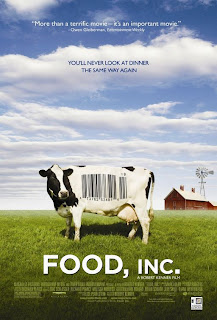Review: "Food, Inc."
 Ever since Michael Moore made it profitable to release muckraking documentaries, it seems to have opened up the floodgates for documentary filmmakers with something to say and injustices to expose.
Ever since Michael Moore made it profitable to release muckraking documentaries, it seems to have opened up the floodgates for documentary filmmakers with something to say and injustices to expose.
The good thing is, that the majority of these films have been quite good. Moore created opportunities for other documentarians, and to be quite honest I think we're all the better for it.
Films like Robert Kenner's expose of the food industry, Food, Inc., are honestly what free speech is all about. It is not only an impressively mounted and slickly produced documentary, but an important and essential film as well. It's the kind of film with the power and potential to make a real difference. Think of it as the Inconvenient Truth of 2009 - a solid, engaging doc with real potential for mainstream success, if only enough people see it and make enough noise.
 Food, Inc. takes a wide-ranging look at America's food industry, and the increasing dangers of chemical and genetic engineering of what we eat. It is a startling expose of just how much the way we eat has changed in the last 50 years. Food production has become consolidated among a very few companies, slaughterhouse conditions are still terrible, corn seems to have infused everything, and modifications meant to increase production have instead upset natural balances and are hurting us more than helping us. Alarming facts like how in 1972, the FDA conducted 50,000 food safety inspections, but in 2006 only conducted 9,164, is enough to make one wonder how much progress is actually hurting us.
Food, Inc. takes a wide-ranging look at America's food industry, and the increasing dangers of chemical and genetic engineering of what we eat. It is a startling expose of just how much the way we eat has changed in the last 50 years. Food production has become consolidated among a very few companies, slaughterhouse conditions are still terrible, corn seems to have infused everything, and modifications meant to increase production have instead upset natural balances and are hurting us more than helping us. Alarming facts like how in 1972, the FDA conducted 50,000 food safety inspections, but in 2006 only conducted 9,164, is enough to make one wonder how much progress is actually hurting us.
It's the kind of thing that most people would rather stick their heads in the sand and ignore. But Kenner refuses to let the audience off the hook. Instead of merely rehashing facts with faceless interviews, he introduces us to real people who have been adversely affected by the conglomoratization of America's food supply. That struggle is embodied by Barbara Kowalcyk, a mother whose 2 and a half year old son died as a result of a new E. coli strain that was created when the bacteria adapted to the cow's corn diet that it was never meant to have. Kowalcyk has since become an activist, trying to get "Kevin's Law" passed, which would help prevent such a thing from ever happening again.
What really sets Food, Inc. apart, however, is that it is not merely content to point out problems. It offers solutions as well. It paints a dark picture, but not a bleak one. There is hope, and Kenner makes it very clear that organic foods are the best viable alternative to the other mess we have gotten ourselves into. And in the name of fairness, it explores legitimate ethical questions about modifying foods and adding growth hormones to increase production. If we have the means to make more food to feed more people, shouldn't we? What if that food could possibly upset the ecosystems and give rise to new forms of harmful bacteria? The questions are almost endless, and Kenner handles them well.
But he also makes his own case very well, and he leaves the audience wanting to take action. Food, Inc. is both disturbing and entertaining, a compelling and eye-opening documentary made with clear-eyed passion and a deep seeded sense of justice. It is clearly a film made out of a real desire to make a difference, and in the right circumstances with the right audience...it may yet do just that.
GRADE - ★★★½ (out of four)
FOOD, INC.; Directed by Robert Kenner; Not Rated.




Comments
I do wish it had been a little less accusatory with some of the government agencies and corporations (even though they refused to comment), and really I would have liked to hear more about how we're supposed to afford organic food. I know it's for the best in every way, but I simply can't spend twice as much on the "right" food at this point in my life. I don't eat fast food, but I'm more likely to buy, for example, a block of Kraft cheese than a block of local farm cheese that can cost up to 3 or 4 times as much.
That was the one solution I didn't really understand, and it didn't seem like that family in Food Inc. did, either.